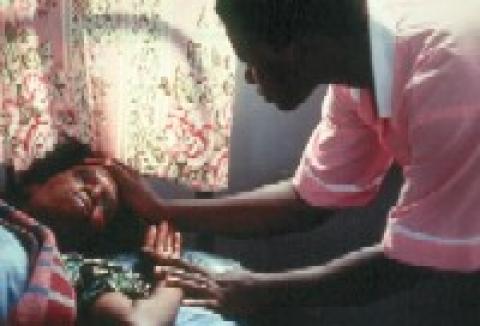
The following reflection, prepared by Fr. Michael Snyder, can be found in A Maryknoll Liturgical Year -- Reflections on the Readings for Year A.
“I will seek the lost, and I will bring back the strayed, and I will bind up the injured, and I will strengthen the weak, but the fat and the strong I will destroy. I will feed them with justice.” Ezekiel 34:16
I have always enjoyed today’s Gospel passage from Matthew. It is such a long and repetitive piece that seems to exaggerate its point to the extreme, and this is precisely why I enjoy it so much!
Jesus says that “all nations” stand to be judged. And the criterion he uses is how “the least,” the most vulnerable, are treated. Jesus, as king, identifies himself with poor and needy people. He wants us to go out among the most vulnerable and feed them, clothe them, do whatever it takes to better the conditions in their lives. The power to choose good and evil is within the reach of all. Jesus wants us to choose goodness. The truly generous are the truly wise. The hand that gives, gathers!
Today we celebrate the feast of Christ the King. The readings emphasize what a king does – he reigns over his people. From the prophet Ezekiel to Paul to Matthew’s gospel we hear that in God’s reign there will be a separation of the good from the bad. But Ezekiel, like Matthew, emphasizes that God will seek out the persecuted, the troubled, the sick, and will bring them under his protection. Ezekiel writes God will give them the strength they need until they are saved. Matthew extends this theme by saying that God as Jesus depends on us, his followers, to assist in extending the reign of God throughout the world.
I am a medical university chaplain in Dar es Salaam, Tanzania. My students are the cream of intelligentsia. They were among the top performers in national exams and thus selected to study here. And they come from all over the country; so there is rich ethnic diversity among them. The university is located adjacent to the national hospital with 1,200 beds.
I walked into one of the main wards at the hospital recently. All the beds were full, yet more patients were lying on the floor right up to the elevator entrance and main door to the building with nothing but a sponge mattress and sheet for comfort. One is overwhelmed upon entering the scene. Maneuvering between the patients, trying not to step on anyone, I approached the patient who had called and asked for my services. As we prayed, others asked if I could spend some time with them. No one cared that I was not African. No one asked for material assistance. They simply wanted prayer and to be strengthened in the faith that says I am not alone in my affliction. God is here with me. I’m a member of God’s kingdom and no matter what happens, all will somehow be well.
The medical students can get discouraged when they enter the wards. The challenges seem so great! That’s why this Gospel passage is so helpful. It keeps repeating over and over the theme: “Just as you did it to one of the least of these …, you did to me ... Just as you did not do it to one of the least of these, you did not do it to me.”
Our hospital is just a microcosm of so many places in the developing world where “the least,” the most vulnerable cry out to their king. And Jesus Christ as King looks to the nations and says I depend upon you to bring relief, healing, peace, and comfort to my people. It is the responsibility of each Christian to assist in the ushering in of God’s reign. And for those who respond generously, giving of themselves freely out of love, God will say: “Come, you that are blessed by my Father, inherit the kingdom prepared for you from the foundation of the world; for I was hungry and you gave me food, I was thirsty and you gave me something to drink, I was a stranger and you welcomed me, I was naked and you gave me clothing, I was sick and you took care of me, I was in prison and you visited me … Truly I tell you, just as did it to one of the least of these …, you did to me.”
